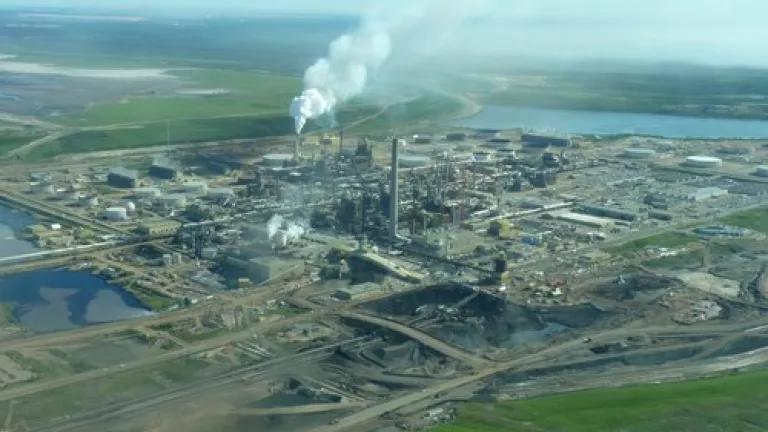
Thanks to the dedicated efforts of farmers and ranchers living along the proposed Keystone XL pipeline and to the more than 1,200 people who were arrested outside the White House, the national media has covered the risks this project poses to nearby communities.
But the danger of the pipeline isn’t limited to its route from Montana to Texas. It reaches back into Alberta, where tar sands development is devouring the Boreal Forest. As the New York Times recently explained, forests like this are a finite resource—one that people around the world depend upon, even those of us living in distant urban centers.
Scientists have known for some time that forests absorb carbon, but only lately have they determined how much: roughly 25 percent of global emissions. By soaking up this enormous chunk of emissions, these carbon sinks are helping slow the progress of climate change.
The boreal ecosystem is especially well suited for storing carbon. Because of its cold temperatures slow decomposition rates, the entire boreal forest stores almost twice as much carbon as tropical forests and nearly three times as much as temperate forests. Taken together, boreal lands hold about 22 percent of all carbon stored on the Earth’s land surface.
But at the same time, these critical tools for fighting the climate crisis are also falling victim to it.
In the northern and central Rocky Mountains, warming temperatures have allowed mountain pine beetles to decimate millions of acres of trees. These pests used to be held in check by severe weather, but winters are milder and warmer, so they can spread north into more and more forests. In Canada, the beetle has devoured an area of forest more than twice the size of Ireland.
Trees are also struggling farther south. From 2000 to 2003, extreme heat and drought combined to kill entire expanses of forests across 60,000 square miles in the Southwest. Prolonged droughts prompt wildfires, and in 2011, the Wallow Fire in Arizona burned more than 800 square miles of forest and scrub land. Southwestern forests take a long time to regenerate, and some never do, suggesting that semi-arid forests may be especially vulnerable to permanent loss.
Tar sands development in Alberta’s Boreal Forest will accelerate this process.
Not only does this dirty fossil fuel release carbon emissions—the production process alone generates three times as much global warming pollution as conventional crude. But it also destroys forest lands that act as a carbon reservoir—further contributing to climate change.
I have flown over the tar sands strip mines in Alberta and it is hard to convey the massive scale of these operations. They stretch from horizon to horizon, gray and black gouges in the earth where there used to be waves of green trees. Spreading out from the active tar sands mines are the signs of exploration as the tar sands—roads cut into the forest, checkerboard clearings—march ever northward.
If President Obama approves the Keystone XL pipeline, TransCanada will pump it full with 700,000 barrels a day, and it will come from clear cutting the Boreal Forest. Building this massive piece of infrastructure will lock us into decades of full-blown exploitation. If it proceeds, there is no way the United States or Canada can meet our carbon reduction goals or combat the dangers of climate change.
Ignoring one of the biggest threats of our time is certainly not in America’s national interest, nor is it in Canada’s. A new report released by Canada’s National Round Table on the Environment and the Economy estimates that climate change could cost Canada about $5 billion a year in 2020, then rising as high as $43 billion per year by 2050—that’s about 1 percent of GDP.
Meanwhile, Canadians on the front lines of climate change are already feeling the effects.
A few years ago, I met Dave Porter, a leader from the Kaska Nation from Northern Canada. Elders in his community see evidence of a changing climate in their rivers and streams, in their salmon runs, and in their forests, which are being destroyed by the mountain pine beetle. The natural consequences are enormous, but as Dave Porter says, the human consequences are even more significant. The Kaska Nation’s effort to maintain an ancient and rich culture will be compromised by these climate-related declines.
Tar sands oil development will fuel these changes. It delivers double damage: it destroys boreal forest lands and it produces one of the most carbon-intensive fuels available. President Obama can slow both of these forces by blocking the Keystone XL pipeline.
Click here to tell the Obama Administration the Keystone XL pipeline must be stopped.
